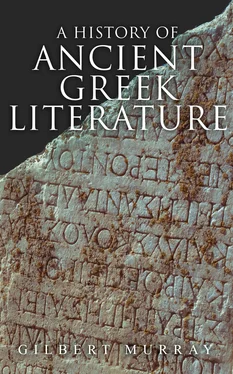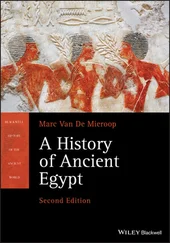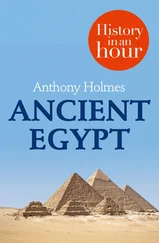1 ...6 7 8 10 11 12 ...20 We find Hellas' and ' Achaia' following similar lines of development with Argos. They denote first Achilles's own district in Phthia, the home of those tribes which called their settlement in the Peloponnese 'Achaia,' and that in Italy 'Great Hellas.' But through most of the Iliad 'Achaioi' means the Greeks in general, while ' Hellas' is still the special district. In the Odyssey we find ' Hellas' in the later universal sense, and in B we meet the idea ' Panhellênes.' This is part of the expansion of the poet's geographical range: at first all the actors had really been ' Achaioi' or ' Argeioi'; afterwards the old names ' Achaioi' and ' Argeioi' continued to be used to denote all the actors, though the actual area of the poems had widened far beyond the old limits and was widening still. The last parts of the Odyssey are quite familiar with Sicily and Kyrêne, and have some inklings of the interior of Russia, and perhaps of the Vikings of the far North. 16
Another gradual growth is in the marriage-customs. Originally, as Aristotle noticed, the Greeks simply bought their wives; a good-looking daughter was valuable as being άλειßοια, 'kine-winning,' because of the price, the εδνα, her suitors gave for her. In classical times the custom was the reverse; instead of receiving money for his daughter, the father had to give a dowry with her: and the late parts of the poems use εδνα in the sense of 'dowry.' There are several stages between, and one of the crimes of the suitors in the Odyssey is their refusal to pay εδνα.
Another criterion of age lies in the treatment of the supernatural. It is not only that the poems contain, as Rohde 17has shown, traces of the earliest religion, ancestorworship and propitiation of the dead, mixed with a later 'Ionic' spirit, daring and sceptical, which knows nothing of mysteries, and uses the gods for rhetorical ornament, or even for comic relief. There is also a marked development or degeneration in the use of supernatural machinery. In the earliest stages a divine presence is only introduced where there is a real mystery, where a supernatural explanation is necessary to the primitive mind. If Odysseus, entering the Phæacians' town at dusk, passes on and on safe and unnoticed, it seems as if Athena has thrown a cloud over him; if Achilles, on the very point of drawing his sword against his king, feels something within warn and check him, it seems to be a divine hand and voice. Later on the gods come in as mere ornaments; they thwart one another; they become ordinary characters in the poems. The more divine interference we get, the later is the work, until at last we reach the positively-marring masquerades of Athena in the Odyssey , and the offensive scenes of the gods fighting in E and γ. Not that any original state of the poems can have done without the gods altogether. The gods were not created in Asia; they are 'Olympian,' and have their characters and their formal epithets from the old home of the Achaioi.
The treatment of individual gods, too, has its significance-though a local, not a chronological one. Zeus and Hera meet with little respect. Iris is rather unpleasant, as in Euripides. Ares is frankly detested for a bloodthirsty Thracian coward. Aphrodite, who fights because of some echo in her of the Phoenician Ashtaroth, a really formidable warrior, is ridiculed and rebuked for her fighting. Only two gods are respectfully handled -Apollo, who, though an ally of Troy, is a figure genuinely divine; and Poseidon, who moves in a kind of rolling splendour. The reason is not far to seek: they are the real gods of the Ionian. The rest are, of course, gods; but they are 'other peoples' gods,' and our view of them depends a good deal on our view of their worshippers. Athena comes a good third to the two Ionians; in the Odyssey and K she outstrips them. Athens could manage so much, but not more: she could not make the Ionian poetry accept her stern goddess in her real grandeur; Athena remained in the epos a fighting woman, treacherous and bitter, though a good partisan. She will never be forgiven for the last betrayal of Hector.
Great caution must be used in estimating the significance of repetitions and quotations. For instance, the disguised Odysseus begins prophesying his return in τ, 303, with the natural appeal : --
"Zeus hear me first, of gods most high and great, And brave Odysseus' hearth, where I am come."
But when he says the same in ξ, 158, not only is the prophecy imprudent when he does not mean to be recognised, but he is also not at his own hearth at all, and a slight surplusage in the first line betrays the imitator: "Zeus, hear me first of gods and thy kind board." The passage is at home in τ, and not at home in ξ.
Similarly, what we hear in κ, 136, is natural : --
"In the isle there dwelt Kirkê fair-tress'd, dread goddess full of song."
Kirkê was essentially 'dread,' and her 'song' was magic incantation; but in μ, 448, it runs : --
" Calypso in the isle Dwelleth fair-tress'd, dread goddess full of song."
Calypso was not specially 'dread' nor 'full of song,' except in imitation of Kirkê; and, above all, to 'dwell fair-tress'd,' the verb and adjective thus joined, is not a possible Homeric manner of behaviour, as to 'dwell secure' or to 'lie prostrate' would be.
In the same way the description of Tartarus in Theogony , 720 -- " As far 'neath earth as is the heaven above " -- is natural and original. Homer's " As far 'neath hell as heaven is o'er the earth" (Θ, 16) is an imitation 'going one better.'
Yet, as a matter of fact, Calypso ( Celatrix , 'She who hides') is probably original in the Odysseus-saga, and Kirkê secondary. There were other legends where Kirkê had an independent existence; and she had turned the Argonauts into bears and tigers before she was impressed to turn Odysseus' companions into pigs. And the Theogony , which is here quoted by the Iliad , itself quotes almost every part of both Iliad and Odyssey . The use of this criterion of quotation is affected by two things -- first, all the passages in question may go back to an original which is now lost, sometimes to a definite passage in a lost epic, sometimes to a mere stock-in-trade formula; secondly, the big epics were so long in process of active growth that they all had plenty of time to quote one another. We have mentioned the Odyssean and Hesiodic phrases in the slaying of Patroclus ( II , 380-480). But the most striking instance of all is that the Hades scene in ω, the very latest rag of the Odyssey , gives an account of the Suitor-slaying which agrees not with our version, but with the earlier account which our version has supplanted (p. 40).
Besides verbal imitations, we have more general references. For instance, the great catalogues in Homer, that of ships in B , of myrmidons in II , of women in λ, are almost without question extracts from a Bœotian or 'Hesiodic' source. Again, much of δ consists of abridged and incomplete stories about the Nostoi or Homecomings of Agamemnon, Aias the Less, and Menelaus. They seem to imply a reference to some fuller and more detailed original -- in all probability to the series of lays called the Nostoi , which formed one of the rejected epics. The story in δ, 242 ff.) about Helen helping Odysseus in Troy, is definitely stated by Proclus -- a suspected witness, it is true -- to occur in the Little Iliad .* The succeeding one (271 ff.), makes Helen hostile to the Greeks, and cannot come from the same source. But it also reads like an abridgment. So does the story of Bellerophon in Z: "Proitosfirst sent him to slay the Chimaira: now she was a thing divine and not mortal, in front a lion, and behind a serpent, and in the middle a wild goat, breathing furious fire . Yet he slew her, obeying the signs of the gods." What signs, and how? And what is the meaning of the strange lines 200 f.? "But when he, too, was hated of all the gods, then verily down the Plain of Wandering alone he wandered, eating his heart, shunning the tread of men." The original poem, whatever it was, would have told us; the resumê takes all the details for granted.
Читать дальше












